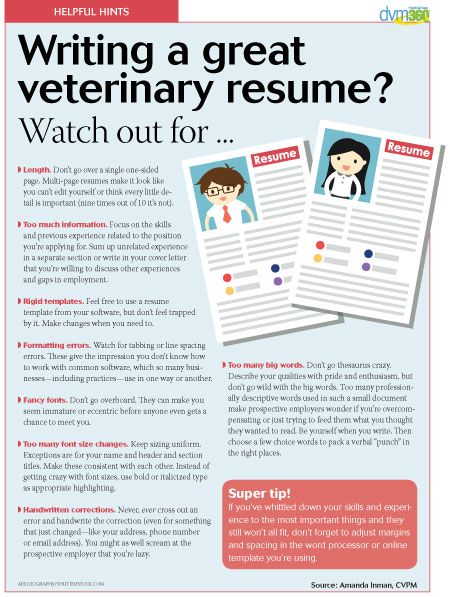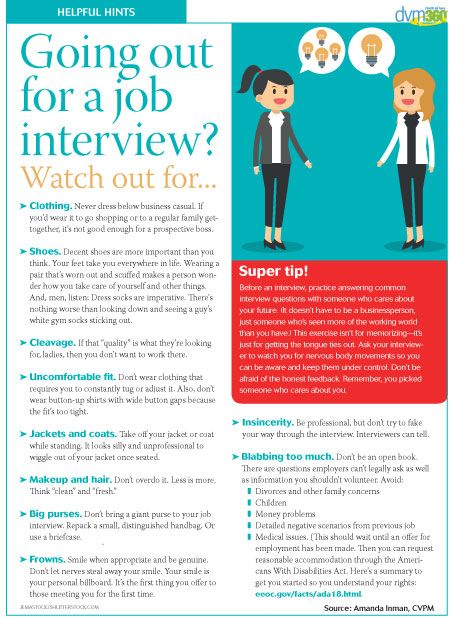Resume, interview tips from a hiring manager
Write your next great resume or nail that next job interview at a veterinary practice with my tips from years of hiring and firing.

Click the image above to download these resume tips. (Illustration Shutterstock.com)No muss, no fuss. I want to get right to the things I've paid attention to as a resume writer and job interviewee-and seen as the resume reader and interviewer.
Download the tips, thumbtack them to your bulletin board
Get them. Keep them. They're yours. Click here for the rad resume tips. Then click here for the inspiring interview tips.
Writing a great resume?
Watch out for ...
> Length. Don't go over one one-sided page. Multi-page resumes make it look like you can't edit yourself or you think every little detail is super-important (9 times out of 10 it's not).
> Too much information. Focus on the skills and previous experience that are related to the position you're applying for. Sum up unrelated experience in a separate section or write in your cover letter that you're willing to discuss other experiences and gaps in employment.
SUPER TIP!
If you've whittled down your skills and experience to THE most important things and they still won't all fit, don't forget to adjust margins and spacing in the word processor or online template you're using.
> Rigid templates. Feel free to use a resume template from your software, but don't feel trapped by it. Make changes when you need to.
> Formatting errors. Watch for tabbing or line spacing errors. These give the impression you don't know how to work with common software, which so many businesses, including veterinary practices, use in one way or another.
> Fancy fonts. Don't go overboard. They can make you seem immature or eccentric before anyone even gets a chance to meet you.
> Too many font size changes. Keep sizing uniform. Exceptions are for your name and header and section titles. Make these consistent with each other. Instead of getting crazy with font sizes, use bold or italicized type as appropriate highlighting.
> Handwritten corrections. Never, ever cross out an error and handwrite the correction (even for something that just changed, like your address, phone number or email address). You might as well scream at the prospective employer that you're lazy.
> Too many big words. Don't go thesaurus crazy. Describe your qualities with pride and enthusiasm, but don't go wild with the big words. Too many professionally descriptive words used in such a small document makes the employer wonder if you're overcompensating or just trying to feed them what you thought they wanted to read. Be yourself when you write. Then choose a few choice words to pack a verbal “punch” in the right places.
Now that you've got a call back on that stellar resume, here's what to do when you're face-to-face with the veterinary practice decision-maker ...

Click above for to download these job interview tips. (Illustration Shutterstock.com)Going out for a job interview?
Watch out for ...
> Dress. Never dress below business casual for a job interview. If you'd wear it to go shopping or to a regular family get-together, it's not good enough for your prospective boss.
> Shoes. Decent shoes at an interview are more important than you think. Your feet take you everywhere in life. Wearing a pair that's worn out and scuffed makes a person wonder how you take care of yourself and other things. Also, men, dress socks are imperative. Nothing worse than looking down and seeing a guy's white gym socks sticking out.
> Cleavage. No cleavage, ladies. If that “quality” is what they're looking for, then you don't want to work there.
> Uncomfortable clothes. Don't wear anything that requires you to constantly tug or adjust it. Also, don't wear button-up shirts with wide button gaps because the fit's too tight.
> Jackets and coats. Take off your jacket or coat while standing. It looks silly and unprofessional to wiggle out of your jacket once seated. > Makeup and hair. Don't overdo it. Less is more. Think "clean" and "fresh."
> Big purses. Don't bring your giant purse with you. Repack a small, distinguished handbag. Or use a briefcase if you absolutely can't leave all those extras in your vehicle.
SUPER TIP!
Before you go to the interview, practice answering common interview questions with someone who cares about your future. It doesn't have to be a businessperson-just someone who's seen more of the working world than you have.
This practice isn't for memorizing; it's just for getting the tongue ties out. Ask your practice interviewer to watch you for nervous body movements so you can be aware and keep them under control as best as possible.
Don't be afraid to get honest feedback from them-remember I said pick someone who cares about you? Don't take it personally!
> Frowns. Smile when appropriate and be genuine. Don't let nerves steal away your smile. Your smile is your personal billboard. It's the first thing you offer to those meeting you for the first time.
> Insincerity. Be professional, but don't try to fake your way through the interview. Employers can tell-they've done this a few times before.
> Blabbing too much. Don't be an open book. There are questions employers can't legally ask you as well as information you shouldn't volunteer. It makes managers just as uncomfortable for you to talk about forbidden or awkward, because it's illegal for us to ask you about it! Avoid subjects like:
> Divorces and other family concerns
> Children
> Money problems
> Detailed negative scenarios from previous job
> Medical issues. Typically, this should wait until an offer for employment has been made. Then you are allowed to request any reasonable accommodation through the Americans with Disabilities Act. Go check it out so you understand your rights. (Here's a lengthy but helpful summary of some key issues.)
Now get out there with your great resume and go shine in that veterinary practice interview. You're gonna wow 'em!
Amanda Inman, CVPM, is practice manager at Pet Care Clinic of Kokomo in Kokomo, Indiana.